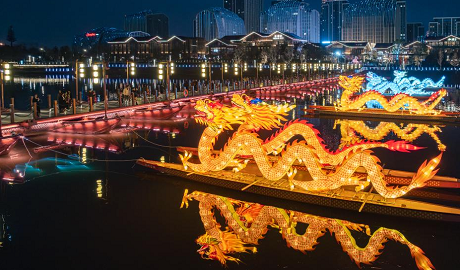

By Hasan Ünal, Professor at Başkent University Department of Political Science and International Relations
When President Xi Jinping outlined the Global Civilizational Initiative in April 2023, he underlined his vision for the shape the world should take in the years ahead as multipolarity has dawned. He emphasized in particular respect for the diversity of civilizations, common values of humanity, importance of inheritance and innovation of civilizations, as well as robust international people-to-people exchanges and cooperation. This, taken together with his earlier pronouncements about Global Security Initiative as well as Global Development Initiative, has laid down the parameters of what promises to be a well-working multipolar world order that would bring with itself a plethora of opportunities for all concerned, even including the US and its allies, who are currently doing everything in their power to nip the emergence of multipolarity in the bud, but to no avail.
Multipolarity has always been the main feature of the world order in terms of balance of power. Indeed, a cursory look at the last five hundred years of European and/or Western history from a political point of view and particularly in terms of power struggle would suggest that multipolarity has always been a striking feature of the world order. Starting with the Portuguese colonial search in late fifteenth century to be followed by the Spaniards through to France’s superiority especially in Europe in the seventeenth century and then England’s entry into the competition across the colonial world following the Spanish Succession War through to German unification in Continental Europe and Russia’s rise in the East… The striking feature of all those long centuries was always a state system by which there would exist a more powerful state than its rivals but never to the extent of one power dictating its will to all the other contenders. So, the great powers would always cancel each other out through balance of power politics. The years leading up to the outbreak of the First World War and indeed the interwar period (1919-1939) witnessed multipolarity at its best or at its worst depending on from where one looks at them.
Bipolarity came about following the Second World War, which cost tens of millions of lives and huge material destruction on an unprecedented and mind-boggling scale. And at the initial stages of the bipolar world order there was also an ideological dimension to that in the sense, on the one hand was the Soviet Union representing the communist/socialist world as opposed to the capitalist block, which styled itself as the ’free world’. However, China’s entry into the balance of power struggle with a view to containing the Soviet Union from early 1950s onwards altered the very ideological nature of bipolarity and even the bipolarity itself because from that point onwards the balance of power struggle turned roughly into an undeclared multipolar one.
Broadly speaking, multipolarity is not something novel that came out of the blue as the US political elites seem to suggest these days. If anything, what has actually come out suddenly of the dissolution of the Soviet Union has been unipolarity that the US has endeavoured to bring about under its hegemonic control in all walks of life, i.e. political, military, economic, financial, social as well as cultural. And this unipolarity was certainly an exception to the rule given the political, military and economic history of the last five centuries.
The major difference that the emerging multipolar world order is bringing about this time around is the fact that the present multipolarity is not going to be a western-dominated one for the first time. Whereas the last five hundred years of multipolarity was basically a European-centered colonial period which always upheld the superiority of the Western civilization looking down all non-Europeans, in the newly emerging multipolar world order there would likely be a number of power centers with different civilizational approaches to international relations. For instance, rising China with its unique cultural traits and no colonial historical baggage has certainly altered the equilibrium of power in economic, technologic, military and financial terms. The fact that China rejects the Western/American notion that the Collective West is entitled to execute wars ostensibly to promote democracy, human rights and freedoms, but in reality to simply further their neo-colonial interests with a view to exploiting the resources of the Global South, and that Beijing advocates for a completely new model of international relations without power blocks, alliances, cultural dominance by one civilization over all the others is like fresh air to an international system gravely polluted by Western hubris for centuries.
It seems as if there would emerge a number of middle-sized powers alongside super powers like China, Russia, US and potentially perhaps few others. Of these middle powers Türkiye would prove to be one with capability to project power in more than one region strategically, economically and in terms of trade. Albeit a member of NATO, it has demonstrated its strategic autonomy in moulding its independent foreign policy since the beginning of the armed conflict in Ukraine by remaining in NATO but keeping aloof of the sanctions that the Collective West has applied to Russia. Moreover, it has cultivated close ties to Russia and even Iran. Indeed, Ankara’s cooperation with Moscow and Teheran over the last six years or so has calmed down tension in Syria paving the way for a normalization of relations between Türkiye and its war-torn southern neighbour. Though the actual normalization has not taken place yet it is expected in the not too distant a future.
Türkiye, which the US and particularly the EU have always treated as their ‘alter ago’, has experienced all sorts of double-standards coupled with a Western colonialist hubris in its dealings with the Collective West, should welcome the Chinese leader’s Global Civilizational Initiative together with his vision of global affairs. Though Ankara pursues a ‘one China policy’ its relations with Beijing on political and strategic matters are not certainly to the desired extent yet but it is certainly safe to say that China’s new vision of international order excluding wars for regime changes supposedly to promote democracy, human rights and all freedoms as well as Beijing opposition to the efforts by the Collective West to create puppet statelets in the Middle East taken together with China’s respect for sovereignty of each and every country, is something very much in line with Türkiye’s national interests.
After all, Türkiye has suffered from the consequences of these brutal wars aimed at regime changes that the US has fostered and executed over the last three decades in the Greater Middle East, including the one in Afghanistan. Huge waves of destitute people moving in all directions trying to escape from their destabilized homelands ended up in Türkiye. And the strategic burden Türkiye has had to shoulder because of all these endless wars with enormous human sufferings has been into the bargain. That’s why not only Türkiye but also the entire Middle East and the Global South are looking forward to welcoming the emergence of multipolar world order on the basis of Global Civilizational Initiative as they have already bid their farewell to the US dominated-unipolarity. It is more likely than not that Türkiye in a multipolar world setting will stick to its course for a multidimensional foreign policy, albeit remaining in NATO, and that such a policy line will not only contribute to the entrenchment of multipolarity across the globe but it will also lead to closer cooperation between Ankara and Beijing.
(Author: Hasan Ünal, Professor at Başkent University Department of Political Science and International Relations)

Various festive events held across China to celebrate upcoming Chinese New Year


Hit epic drama sparks interest in lesser-studied chapter of ancient Chinese history

Lanterns hoisted to mark upcoming Chinese New Year in Hong Kong

"In-train fair" launched in NE China's Heilongjiang amid Spring Festival travel rush
点击右上角![]() 微信好友
微信好友
 朋友圈
朋友圈

请使用浏览器分享功能进行分享
